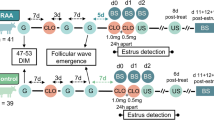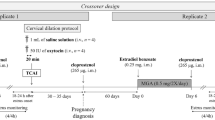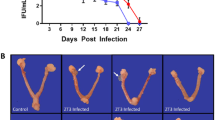Abstract
Willett et al.1 and Brock and Rowson2 reported that pyometra frequently followed the insemination of cows when in the luteal phase of the œstrous cycle; but no definite reason for this occurrence was forthcoming. The present communication gives the results of experiments carried out on cows at various stages of the œstrous cycle and also on cows that had been ovariectomized.
This is a preview of subscription content, access via your institution
Access options
Subscribe to this journal
Receive 51 print issues and online access
$199.00 per year
only $3.90 per issue
Buy this article
- Purchase on Springer Link
- Instant access to full article PDF
Prices may be subject to local taxes which are calculated during checkout
Similar content being viewed by others
References
Willett, E. L., McShan, W. H., and Meyer, R. K., Proc. Soc. Exp. Biol. Med., 79, 396 (1952).
Brock, H., and Rowson, L. E., J. Agric. Sci., 42, No. 4 (1952).
Author information
Authors and Affiliations
Rights and permissions
About this article
Cite this article
ROWSON, L., LAMMING, G. & FRY, R. Influence of Ovarian Hormones on Uterine Infection. Nature 171, 749–750 (1953). https://doi.org/10.1038/171749a0
Published:
Issue Date:
DOI: https://doi.org/10.1038/171749a0
This article is cited by
-
Salpingitis Impairs Bovine Tubal Function and Sperm-Oviduct Interaction
Scientific Reports (2019)
-
Relationship of Ovarian Hormones to the Pyogenic Effect of Corynebacterium pyogenes
Nature (1955)
Comments
By submitting a comment you agree to abide by our Terms and Community Guidelines. If you find something abusive or that does not comply with our terms or guidelines please flag it as inappropriate.



